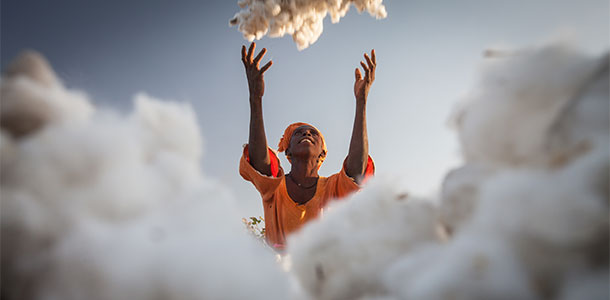Actions on the materials used
- Commitment No. 4 -

Focus 2022
Viscose, the new cotton
The first natural fiber used in the world, cotton is also very water and energy consuming.
As the textile industry strives to reduce its impact on the environment, professionals are turning to a new bio-based fiber, derived from cellulose pulp extracted from trees and reprocessed into viscose. This synthetic fiber of natural origin is largely supplied by India. The fashion industry favors it for its technical performance and comfort, similar to cotton. By working with factories that secure the treatment of effluents and do not participate in deforestation, the textile industry is opening up a more ecological and responsible way forward for the sector. For example, the TENCEL and ECOVERO brands guarantee an 80% reduction in solvent consumption, thus limiting the pollution of reprocessed water.

Focus 2021
Organic cotton and recycled polyester: the ideal mix for the planet
The qualities of organic cotton are no longer in question.
Ten times more water-efficient than conventional cotton, grown without chemical inputs and produced in a way that respects people and the earth, this certified raw material is even more interesting when mixed with recycled polyester (RPET).
Produced from the fusion of polyester, after recycling small plastic bottles, organic cotton helps reduce the amount of plastic waste that ends up in the environment, including the oceans. The combination of natural and man-made materials gives the fabric greater strength and reduces the carbon footprint of the textile industry. Organic cotton today represents less than 1% of world production. RPET can save up to 60% of energy.


Focus 2020
Recycled polyester, a circular material par excellence
Protecting men and women at work is the purpose of protective clothing (PPE). In order to face accidents and bad weather, they must meet precise standards (in particular the EN 340 standard) and guarantee the safety of the worker by ensuring a minimum risk of physical injury or illness. Their role is to prevent mechanical and chemical aggression. Technical protective clothing is adapted to various professional risks (chemicals, fire, heat, cold, humidity, insects, etc.).
CEPOVETT SAFETY works in particular with its supplier TDV Industries to manufacture PPE made of recycled polyester and labeled GRS. Made from plastic bottles, this material has insulating properties that allow it to be used outdoors and it is part of a circular economy logic.
Focus 2019
An eco-designed Chamatex fabric made in France
Fervent defender of Made in France, based in Ardèche, the manufacturer of technical fabrics Chamatex elaborates products with high added value. An integrated manufacturer of textiles for over 30 years, the company has been able to adapt to the evolution of trends and the industry, to offer a wide range of technical fabrics to the leading players in the professional clothing and sports sectors. CEPOVETT Group and Chamatex have joined forces on this project to co-develop a fabric that meets the requirements of mountain professionals, offering a perfect compromise between protection, comfort and durability, and with a strong ethical added value. The new collection elaborated by CEPOVETT Group to dress the instructors of the ESF Courchevel 1850 benefits, Thus, an eco-designed fabric, made from a yarn from the European recycled polyester industry, woven, dyed and ennobled in a geographical circle of less than 100km, 100% in the Rhône-Alpes region.
Focus 2018
Eco-socially responsible professional clothing
Favour innovative and bio-sourced materials. CEPOVETT Group offers its customers alternative materials such as recycled polyester, linen known for its exceptional resistance, its absorbent and anti-bacterial fibers that do not require any pesticide and little water for its cultivation. The year 2017 marks a shift in the use of linen. By favouring this natural fibre, used for hundreds of years by our grandparents, CEPOVETT Group favours local supplies.
European flax is grown from the south of Normandy to the north of France, Belgium and the Netherlands. 80% of the world's production of flax fibre is of European origin and France is the world leader. Lafont, one of the CEPOVETT Group brands, integrates it in its new collection and mixes this local natural material with a recycled synthetic fiber from small plastic bottles: R-PET. In 2018, CEPOVETT Group will continue its work of evangelizing to its customers so that tender after tender, they will favor the use of alternative raw materials, such as organic or fair trade cotton, linen or recycled polyester.
Focus 2017
2017 Report
Favour innovative and bio-sourced materials. CEPOVETT Group offers its customers alternative materials such as recycled polyester, linen or hemp, known for its exceptional resistance, its absorbent and anti-bacterial fibers that do not require any pesticide and little water for its cultivation. In 2016, CEPOVETT Group is rolling out hemp and linen fabric to eventually replace cotton.
By privileging these natural fibers, CEPOVETT Group favors local supplies. European flax, cultivated from the south of Normandy to the north of France, Belgium and the Netherlands, is the only vegetable textile fiber originating from the continent and cannot be relocated: 80% of the world production of flax fiber is of European origin and France is the world leader.
It is a rare product that represents less than 1% of textile fibers consumed in the world. France is the leading European producer and the second largest producer in the world. Natural and local resources, therefore, from which CEPOVETT Group will be able to draw for the manufacture of its clothing of tomorrow. The company also asserts itself as a leader in the use of plastic bottles to offer eco-responsible fibers to its customers. R-PET has the characteristic of being easily recycled for multiple uses, including polyester fiber used in the manufacture of warp and weft fabrics, fleeces and other technical clothing.
Focus 2016
2016 Report
With more responsible supply chains, CEPOVETT Group's professional clothing collections are made up of a majority of natural materials that have a reduced impact on the environment compared to synthetic materials. We favour supplies that guarantee a reasoned culture. Chemicals and pesticides are limited in order to reduce pollution of soil, water and living organisms.
Beyond the fair cotton approach, CEPOVETT Group proposes to its customers alternative materials such as recycled polyester, resulting from the recycling of plastic bottles, and hemp which could eventually replace cotton. In 2015 and beyond, a commitment to organic and fair trade cotton will help protect the environment and preserve biodiversity for local people. The promotion of traditional farming methods is also a way to use irrigation methods that consume less water than intensive production.


